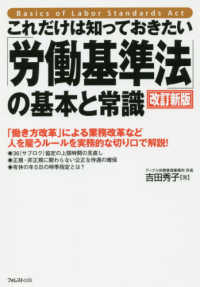Full Description
How do marginalized communities speak back to power when they are excluded from political processes and socially denigrated? In what ways do they use music to sound out their unique histories and empower themselves? How can we hear their voices behind stereotyped and exaggerated portrayals promoted by mainstream communities, record producers and government officials?
Sounding Roman: Music and Performing Identity in Western Turkey explores these questions through a historically-grounded and ethnographic study of Turkish Roman ("Gypsies") from the Ottoman period up to the present. Drawing on extensive ethnographic fieldwork (1995 to the present), collected oral histories, historical documents of popular culture (recordings, images, song texts, theatrical scripts), legal and administrative documents, this book takes a hard look at historical processes by which Roman are stereotyped as and denigrated as "çingene"---a derogatory group name equivalent to the English term, "gypsy", and explores creative musical ways by which Roman have forged new musical forms as a means to create and assert new social identities. Sounding Roman presents detailed musical analysis of Turkish Roman musical genres and styles, set within social, historical and political contexts of musical performances. By moving from Byzantine and Ottoman social contexts, we witness the reciprocal construction of ethnic identity of both Roman and Turk through music in the 20th century. From neighborhood weddings held in the streets, informal music lessons, to recording studios and concert stages, the book traces the dynamic negotiation of social identity with new musical sounds. Through a detailed ethnography of Turkish Roman ("Gypsy") musical practices from the Ottoman period to the present, this work investigates the power of music to configure new social identities and pathways for political action, while testing the limits of cultural representation to effect meaningful social change.
Contents
Figures and Charts
Acknowledgements
Notes on Transliteration
About the Companion Website
0. Prelude: Sounding Social Identity
1. Towards a History of Social Construction:
The Formation of Romani Groups in the Byzantine and Ottoman Empires
2. Romani Professional Entertainers in the Ottoman Empire:
Melody Players and Merriment Makers
3. Inscribing "çingene" in Late Ottoman Cultural Forms
4. Exnominating Turk, Hyper-nominating "çingene":
Musical Representations of Ethnicity and Turkishness in the Early Republic
5. From çingene Accompanist to Instrumental Soloist: The New Roman Stars
6. Recording "Roman": Sonic Representations on 45 rpm Recordings
7. The Poetics of Singing Roman:
Metaphoricity to Mimesis in Roman Dance Songs
8. Presenting Turkish Roman:
World Music and Musical Cosmopolitanisms
9. Politicizing Roman and the Folklorization of Ethnicity
10. Conclusions and Openings:
The Promise and Limitations of Musical Plurality
Notes
References
Index








